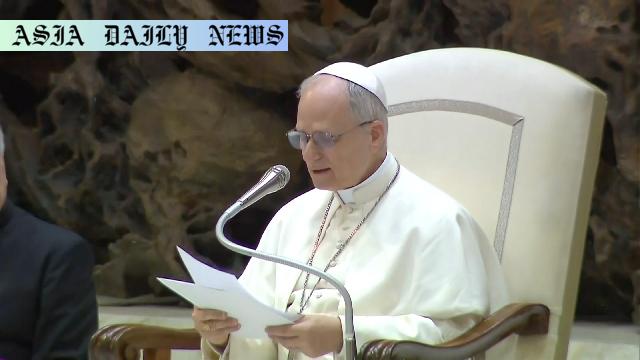Peace begins with each one of us: in the way we look at others, listen to others and speak about others.
Peace begins with how we treat, listen to, and view others.
The pope highlighted rejecting war and communication ethics.
He commended journalists who tirelessly report at great sacrifice.
He discussed the need for AI responsibility to benefit humanity.

A Call to Reject Violence: Pope Leo’s Vision for Peace
Pope Leo XIV, recently elected as the head of the Roman Catholic Church, used his inaugural address to inspire global individuals and, more specifically, members of the media. Speaking to an audience of thousands at the Vatican, the newly crowned pontiff urged people to reject violence and adopt a paradigm of peace. His strong message centered on how individual actions and communication shape collective harmony. “Peace begins with each one of us—in the way we look at others, listen to others, and speak about others,” he affirmed, emphasizing that fostering understanding starts at a personal level.
According to Pope Leo XIV, the media holds an unparalleled responsibility in creating or maintaining a societal ethos. Highlighting the growing tendency of divisive narratives, he reminded journalists of their enormous influence as they report to billions worldwide. “We must say ‘no’ to the war of words and images,” he stressed. The discourse also touched upon journalistic integrity and commended those who risk their lives covering the realities of war zones, standing as sentinel defenders of dignity and justice. “Only informed individuals can make free choices,” he reminded the audience, signaling a deeper appeal to truth and valor in journalism’s enduring role.
Artificial Intelligence: Promise and Responsibility
Pope Leo XIV extended his discourse by addressing one of the contemporary world’s most pressing topics—artificial intelligence. AI, as the pontiff pointed out, carries immense possibilities for transforming global functionalities, but it also demands discernment and ethical use. He emphasized its role for “the good of all,” warning against its misuse, which could lead to stark consequences for humanity. “Artificial intelligence requires responsibility and discernment,” he stated, signaling an international call for conscientious innovation.
The pope painted a vision where technology and faith converge, advocating for a more equitable and compassionate future for humanity. His words were reminders that no matter how far technology advances, ethical considerations and shared human values must remain at the core of its applications, ensuring it benefits everyone universally.
Communication as a Tool for Peace
Underscoring the critical role of communication, Pope Leo XIV highlighted its significance as a tool to bridge the divide between warring entities or opposing ideologies. In today’s interconnected world, the way we articulate and disseminate ideas often plays a role in either building or breaking communities. Encouraging journalists to pursue unbiased, authentic reporting, the pope illustrated the necessity of a media ecosystem rooted in empathy, truth, and mutual respect.
He concluded with a powerful reminder: “Peace begins with each one of us.” These words encapsulated his overarching message that small acts of understanding, fairness, and ethical communication collectively hold the potential to transform societies. With his leadership only beginning, Pope Leo XIV’s emphasis on rejecting the paradigm of war resonates as both a challenge and an invitation to the global community to rethink its priorities and actions.
Commentary
Pope Leo XIV’s Transformative Vision: A Personal Reflection
In an era often marred by divisions and conflict, Pope Leo XIV’s address was a clarion call for humanity to reassess its priorities. As he articulated a rejection of the “paradigm of war,” his message resonated deeply, providing a much-needed reminder of the values that unite us. Rejecting war, whether literal or symbolic, requires profound inner reflection, coupled with actionable changes in how we engage with one another. His words evoke a sense of personal responsibility for peace—a notion that each interaction, gesture, and conversation carries the potential to ignite change. This emphasis on equitable communication stands out in an age where misinformation and hostility often dominate headlines. To me, this reflects not just hope but a roadmap to creating a kinder, gentler society.
Mediated Realities: Journalism for Justice
One of the most striking aspects of the pope’s speech was his acknowledgment of the incredible sacrifices made by journalists around the world. To spotlight their courage and integrity in a high-profile global address sends an important message: journalism is not just a profession, it’s a calling to defend truth and human dignity. In a world where media narratives are often manipulated, Pope Leo’s praise for truthful reporting serves as both a critique and a call to action for the media industry. I am inspired by his belief in the transformative power of informed citizens, empowered by honest storytelling. When journalists operate with integrity, they lay the groundwork for peace by bridging gaps in understanding and exposing injustices wherever they may occur.
The Digital Frontier: Ethical Oversight for AI
Pope Leo XIV’s inclusion of artificial intelligence in his speech is not only timely but urgent. With advancements in AI occurring at an unprecedented rate, his message of responsibility and ethical application hits home. As exciting as AI’s potential is, its misuse could exacerbate inequalities or even fuel conflicts. His insistence that AI be harnessed for the good of all humanity speaks to the broader question of technological stewardship. What struck me most was his belief in aligning human innovation with shared ethical values. As someone fascinated by technology, I see his stance as a challenge not just for developers and corporations, but for all of us to demand ethical accountability in the digital age. Pope Leo XIV’s address is more than an inaugural speech—it is a manifesto for a just and peaceful future.


